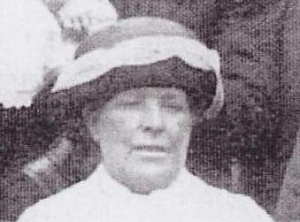By Christine Swan
My great grandmother, Rebecca Bull, was born in Bristol in 1870. The family lived near the city centre, in the area where the Cabot Circus shopping centre now sits. Her father, William Henry Bull, was a chairmaker and her mother, Eliza Rosina, kept house. William Henry was drawn, as were so many, to do better for his family and, like so many, was drawn to London. In about 1878, the family left their native Bristol and William Henry moved himself, Eliza Rosina and their now five children to Shoreditch in the East of London. By 1881, two more children had joined the growing Bull family in Charles Street. Rebecca was twelve years old at this point and, as the oldest daughter, was probably involved in the care of her younger siblings.

The Bull family in Bristol in 1871
In 1891, at the time that the England census was taken, Rebecca
was recorded as visiting Richard and Elizabeth Johnstone in Holmbrook Street,
Homerton and working as a pickler. I am unsure what she was pickling, but in
the days before the refrigerator, this was an important way of preserving
produce to enjoy year round. George Betts was living in nearby in Milborne
Street, just twenty minutes walk away. The
census was taken in April but by October, Rebecca and George were married at St
Luke, Homerton Terrace when she was twenty two years old he, just two years
older. Rebecca’s parents were both witnesses to the marriage and while both
William Henry and George both signed their names, Eliza Rosina and Rebecca could
not. My father told me that Rebecca had never learned to read and write
although I have discovered a contradiction to this. It appears that it was
Rebecca who completed and signed the 1911 census.

Rebecca Bull working as a pickler in 1891
Unfortunately, Rebecca’s age meant that although the
Education Act of 1870 set up school boards to manage education provision in
their locality, attendance was not compulsory. A further act in 1880 made
Education compulsory for children aged between five and ten. Further acts in
1891 and 1899 increased the compulsory age to eleven and then twelve. Therefore,
many adults had to manage without being literate. Rebecca’s husband had
attended school by courtesy of the family of his biological father. By 1870,
when the first Education Act was implemented, it is estimated that 20% men were
illiterate and 25% of women (Lloyd, 2007). However, for working class families,
sending their children to school rather than to the factory, and subsequent
loss of earnings, meant that fewer were literate and there didn’t seem to be any
compulsion for parents to make their children attend. I would like to think
that at some point in her adult life, Rebecca did learn, perhaps instructed by
one of her older children, or even George. I cannot imagine the frustration of
living in a world where the written world is functional and necessary, but also
to be denied the ability to lose oneself in fiction or a beautiful poem.

Many adults were illiterate before the Education Act made school attendance compulsory
It seems that George and Rebecca were a well-matched pair and
my paternal grandmother and my own father, remember a happy home with much love
and kindness, but very little money. They had a large family but precarious
financial means of support. In the early days of their marriage, George and
Rebecca lived with her parents at 15 Ada Street, Hackney. This must have been
quite a squeeze as the Bulls still had five children living at home and, in
1892 Eliza Rosina Betts was the first child in the Betts brood. A second
daughter, Helena Rebecca, was born in 1895, but sadly, she died aged just one. Their
son George was born one year later and another daughter, Lizzie, in 1899.

Rebecca at a family wedding in the early 1920s
1911 saw the family living in Colchester Road and had been
joined by Ethel, Daisy, Louisa and Emily. The growing family struggled on
George’s irregular wages but, as his work ethic was legendary, so was Rebecca’s
ability to make something out of very little. My father remembered her huge
pots of stew, often shared with neighbours, who were similarly in need. As the
children grew, they were able to contribute to the family coffers which would
have helped. Rebecca would also attend funerals of those who had no family. She
felt that attending as a mourner would be of benefit and everyone who knew her
commented on her kindness. She would also collect clothing and distribute it to
those in need – a warm winter coat, or a pair of shoes with fewer holes. Her
mission in life was to make that of others more bearable. This goodness rubbed
off on her children, who were all kind and generous with what they had.
When my grandmother, Daisy, married, she lived next door to her parents. My father recounted that he would always visit his grandmother after school and that she would always have some delicious food for him. He would keep quiet when he returned home but sometimes, was just too full to eat his dinner, which caused Daisy to remind her mother not to spoil him, but, Rebecca couldn’t resist. “I was her favourite”, my dad would proudly claim, although I believe that Rebecca possessed the ability to make everyone believe that they were her favourite.
Rebecca died in 1937 and this dealt a devastating blow to
the family. My dad would become tearful when he remembered his adored granny.
She was the glue that held the family together, who met their needs in so many
ways. Everyone was a better person having known her. I asked my dad if he
remembered if Rebecca retained her Bristolian accent. He believed that she had,
although it was somewhat faded from years of living in London. Quite charmingly,
in the 1911 census, her birthplace is listed as “Bristle”, which I imagine her
saying, followed by “my lover”.



Leave a comment